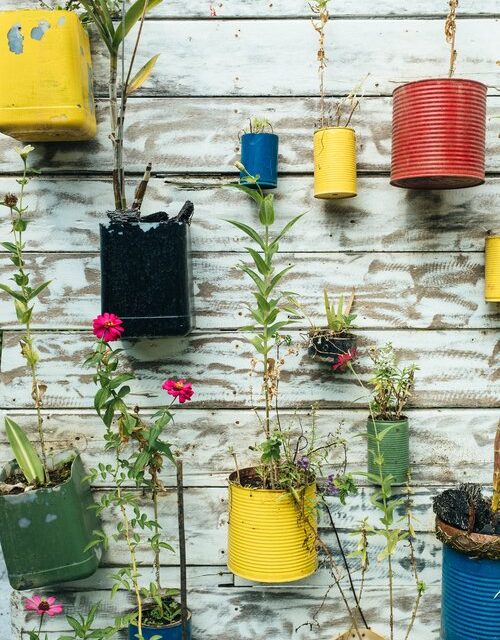Imagine the typical home in the United States. Each week bags of groceries and household goods come in through the front door and each week large bags go out the back. Even if you’re buying healthy, organic food, non-toxic cleaning products, and natural beauty products, there’s still a lot of stuff coming in and out of your house on a weekly basis.
With all of this extra time spent at home, I’ve started making a conscious effort to focus on the little stuff in my life that are wasteful. Because if we’re being honest with ourselves, we can all be less wasteful. All it takes is being mindful and asking yourself a simple question, “how can I be more sustainable?”
Sustainability is the “avoidance of the depletion of natural resources in order to maintain an ecological balance.” In other words, what can we avoid from depleting in our homes and how can we reuse the resources we have?
The good news is, there are a lot of ways to live a more sustainable lifestyle without changing your life dramatically. If we can focus on these three words – reuse, reduce, recycle – and bring more purpose into everything we do, we can help the environment with these following steps.
1. Reuse
The first step you should focus on is to invest in reusable and durable products instead of wasteful disposables. This goes for in-home or even when on the go!
- Stasher bags for non-toxic, reusable storage bags instead of plastic
- Microfiber cloth instead of disposable wipes and paper towels
- A glass or stainless steel straw instead of a plastic straws
- Reusable tableware and utensils instead of throwaway
- Glass or stainless steel cups or bottles to go instead of plastic bottles
2. Composting Made Easy
Turn food scraps into valuable dirt for your garden! Start small with a kitchen compost bucket. Find an outdoor space for a compost bin. Let worms do the work if you’re up for vermiculture. I now have a small metal bin in my kitchen that whenever I’m cooking I just put all compostable foods into the tin and throw it out by end of the day! If you’re not up for creating your own composted dirt, check your City’s provided garbage bins. Did you know that you can put all of your compost goods in the Green Bin? Start with this step and see how easy it is!
3. Recycle Recycle Recycle!
I cannot stress the importance of recycling enough. Go beyond curbside recycling, and try to recycle everything you can. Here are a few suggestions:
- Office store suppliers take old cartridges and old cell phones
- Donate pillows and blankets to the humane society
- Donate clothing to Goodwill or other local thrift stores
- Bring dry cleaning hangers back to the dry cleaner!
4. Reduce Energy
Energy conservation is not only a huge way we can help our ozone, but it can help reduce your electricity bill. Here is an easy list of things you can do in your house to help reduce your carbon footprint.
- Replace all light bulbs to LED lights
- Turn off lights in your rooms when you’re not using it
- Open windows for airflow instead of turning on the AC. But if using HVAC, program your thermostat to lower/increase the temp when you’re not home.
- Buy energy efficient appliances
5. Shop Locally
My favorite thing to do on Saturday is go to the Farmer’s Market. There is something special about buying produce, meats, fruits, veggies, and even bread made or grown locally from someone. I like knowing that my meat is grass-fed with no hormones and GMOS added, and that the peaches I buy don’t have to drive across states to get to me. When your food is locally sourced, it tastes that much better. And let’s be honest, eating clean is something we all need to do right now!
6. Grow Your Own Food
There is nothing more rewarding than going to your own garden to pick vegetables for a meal. This was definitely a covid project but it is something that brings me great joy. The best part is, you don’t necessarily need a garden-you can easily grow a few of your staple edibles indoors. Here are some foods you can grow indoors, with quality pots and soil:
- Herbs
- Strawberries
- Salad leaves
- Tomatoes
7. Rely Less on Your Car
Walk and bike when you can. Try and walk to your local grocery store or to your next dinner destination. Plan ahead when it comes to running errands. Maybe you can find all the things you need in one shopping center, or perhaps you can run one errand next week when you are in that part of town. Not only are you helping the environment, but you are getting those daily steps in too!
8. Preserve Water
There are many ways we can save water in our own homes. The most obvious is to turn off the tap when washing dishes or brushing your teeth. But there is more you can do:
- Install water-saving aerators on all of your faucets
- Wash your pets outside
- Time your showers to keep them under 5 minutes
- While you wait for hot water, collect the running water and use it to water your plants.
No matter how much you’re already doing to reduce waste in your home, there’s always more that you can do. During this stay-at-home COVID period, I’ve come to realize that a happy home is not just beautiful in it’s design, but mindful in it’s being. If you want to run a more sustainable household and reduce waste, pick one thing from this list and implement it this month.
If we keep focusing on the little stuff, we can reduce waste. Together.


